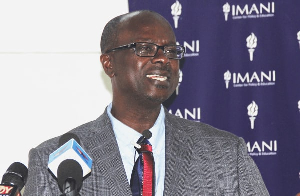Ishmael Mensah Blog of Wednesday, 1 January 2025
Source: Ishmael Mensah
Giving your appointees the National Awards has the risk of being perceived as political favoritism, which would damage their reputation—Lawyer

Prof. Kwaku Asare, often known as Kwaku Azar, is a private lawyer and accounting professor who has criticized President Akufo-Addo for utilizing the National prizes to bestow prizes on his appointees.
Prof. Asare voiced concern about the way in which succeeding administrations had abused the program to give awards to their appointees, despite the fact that the program's purpose was to recognize exceptional accomplishments that inspired the country and cut beyond national boundaries.
He maintained that there are situations in which a leader may have good reason to show gratitude to their appointments, but that these choices necessitate rigorous evaluation of morality, public opinion, and the core goal of national honors.
"Appointing your own appointees may raise questions about impartiality and appear biased," the lawyer wrote in an opinion article.
First of all, a president's choice to select appointees may seem prejudiced to the appointing power, casting doubt on their objectivity.
Second, these honors run the risk of being perceived as acts of political favoritism or self-congratulation, which would damage their reputation.
Third, national prizes have always been saved for exceptional accomplishments by non-governmental actors. The public perception of these accolades could be negatively impacted if they are extended to ministers and other appointments.
The lawyer's worries follow President Akufo-Addo's presentation of national honors for national service to Vice President Dr. Mahamudu Bawumia and some of his ministers.
See his complete viewpoint below.
One of Ghana's highest accolades, the Order of the Volta, was established by Kwame Nkrumah in 1960. He only gave it to the first woman in space, Valentina Tereshkova, once during his six-year presidency.
This act's rarity highlighted the award's significance and exclusivity, honoring remarkable accomplishments that inspired the country and across national boundaries.
However, it seems that presidents have been using the award more frequently in recent years, frequently to celebrate their own appointees. This tendency runs the risk of politicizing what ought to be a national celebration of outstanding achievements.
Even if appointees may occasionally be chosen for legitimate reasons, these choices require thorough evaluation of public opinion, ethics, and the core goal of national honors.
Of course, there are good reasons why a president should accept his own appointees.
First, ministers and other appointees contribute to the progress of the country while working under a lot of pressure. Acknowledging their efforts can validate outstanding service and commitment. The President is in a unique position to assess these initiatives.
Second, honoring exceptional appointees sets standards for excellence in public service and motivates others to aim for comparable results.
Third, rewards based on quantifiable accomplishments might encourage appointees to produce outcomes that advance the country.
Lastly, public acknowledgment can foster pride and solidarity if appointees reach transformative achievements.
However, there are significant objections to these awards that cannot be disregarded.
First of all, a president's choice to select appointees may seem prejudiced to the appointing power, casting doubt on their objectivity.
Second, these honors run the risk of being perceived as acts of political favoritism or self-congratulation, which would damage their reputation.
Third, national prizes have always been saved for exceptional accomplishments by non-governmental actors. The public perception of these accolades could be negatively impacted if they are extended to ministers and other appointees.
These appointments already have visibility, power, and access to resources. Since their mandate includes public service, other types of recognition might be adequate.
In the future, it might be time to set up a formal procedure to guarantee that national awards are given out in an open manner using standards based on quantifiable accomplishments. In order to remove the possibility of executive interference and preserve objectivity, we should also think about creating an independent committee to evaluate nominees.
Additionally, we should only give honors to appointees whose accomplishments have a major national impact, go above and beyond their official responsibilities, and exhibit extraordinary leadership or inventiveness.
To maintain the integrity of national prizes, we can, if needed, look at alternative ways to honor ministers' efforts, such public recognition or commendations.
In conclusion, giving national prizes to appointees is not always wrong, but it must be done so openly, fairly, and with consideration for the honors' original intent.
Priority should always be given to preserving public confidence in governance and preserving the honor of national honors. Otherwise, we run the risk of making these prizes less prestigious!
Da Yie!














